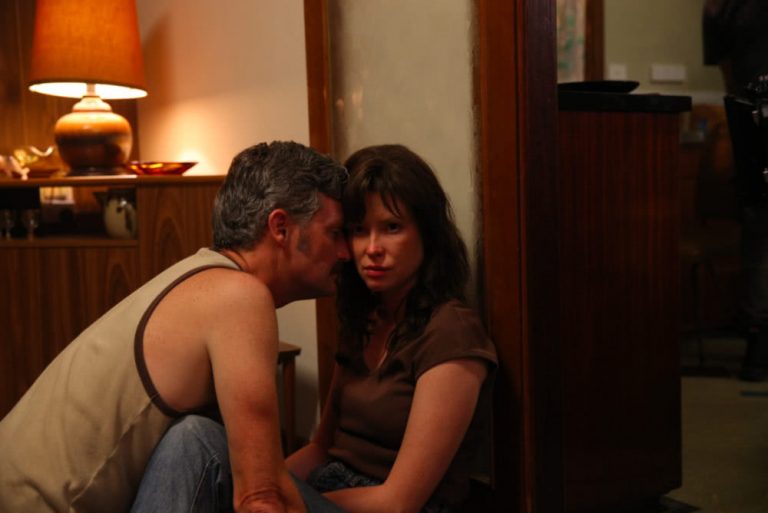Patrick Bateman, Hannibal Lecter, Errol Childress from True Detective; monsters all, but we find them monstrous because of the everyday mask they wear. They horrify not due to their fangs or eldritch appendages, but because they could so easily be someone you walk past on the street. Could be your neighbour, perhaps.
Following that tradition, Hounds Of Love is one of the most unnerving films to appear on Australian screens in many years, propelled by a main cast delivering some of the finest performances of their careers. Better known for his larrikin comedic charm, as the remorseless serial killer John White, Stephen Curry is a man transformed.
“Charm. That’s an interesting word,” Curry says reflectively. “I don’t think it’s that different in terms of characterisation, oddly enough, than doing comedy. What set this role apart for me was the fact that every other character I’ve played that might be considered charming was a person that, well, actually had charm. As a character, they were somehow charming. The difference in this role, this is a human being who doesn’t possess natural charm, natural empathy or love. All the things that psychopaths are devoid of.
https://www.youtube.com/watch?v=UNEurXzvHqE
“What he’s doing is actually just acting. He’s spent his entire life acting. He’s affecting charm, he’s affecting empathy to keep his wife on side. He is a great manipulator, and the way you manipulate well is to affect all of these emotions. There’s a scene where he’s having a shave and looking at himself in the mirror, and we wanted that to be complete and utter joy he has at looking at himself. The victory that he sees when he sees himself, the only person that matters.”
Though worlds apart, we haven’t seen such a harrowing and uncomfortable feature since Wolf Creek. Yet while Wolf Creek is at heart a slasher (and an effective one, at that), Hounds Of Love taps into a different vein of horror. After sneaking out of home, schoolgirl Vicki (Ashleigh Cummings) is abducted one warm Perth night by the deceptively friendly couple, John and Evelyn White (Emma Booth). One poor decision leads to another, and in short, awful order she is gagged and chained to a bed that has seen numerous other girls abused and murdered.
It is by no means a pleasant film, and yet it is never a gratuitous one. Its subject matter may be quite distressing, but its contents are depicted in solemn, affecting fashion. For Curry, the role presented a challenge like no other, and one which he was only able to face with the great trust and talents of the film’s exceptional female cast.
This is a human being who doesn’t possess natural charm, natural empathy or love. All the things that psychopaths are devoid of.
“It was very hard. Very hard. It’s not hard to get in, it’s hard to get out,” he says. “You mentioned the trust between Emma and Ashleigh, and you’re spot on. You have to have trust and respect for each other, have respect for the material first and foremost. [Director] Ben Young set this tone from the top. We need to respect the difficulty of this story. Those are two of the most compelling and heartbreaking performances from those women. They are mind-boggling strong performances, and that’s why it’s hard to get out. You see the heartbreak in both their eyes.
“From my character’s perspective I suppose, I was more effected by Ashleigh, because this is stuff that I was doing to her. You’d have to be heartless not to be. People genuinely go through this sort of stuff, and it’s evident in Ashleigh’s eyes, and you can’t sell that short. You can’t treat that lightly. I often find it easy to break out of other characters because you stop and can just go about being your normal self. Then you get to work and do it again. Not this one. And it’s because of these amazing women going through this torment, and I want to be there for them, be 100% committed for the entirety of the piece, because that’s what they’re doing.”
The film can be almost unbearably tense, where moment to moment it is difficult to tell what is about to unfold. Curry refers to the film as a psychological study of co-dependence, and his own character as the study of a psychopath – which says a great deal about the emotional weight his on-screen wife (Booth) must carry. Perth has itself seen murderous couples in the past – the Moorhouse Murders of 1986 are a loose inspiration – and the psychological insights it offers are grim; sadly, they’re not far removed from reality.
It’s so disgusting and unthinkable that this happens, but it happens. That’s the saddest part of it.
“When he has as little power in the real world, is treated by the real world as he is – as a nothing – it informs his intrinsic need to take a stranglehold on the power in his own house,” says Curry. “It’s like his own sad little cave. The more power he can elicit in there, the better he feels. Hounds Of Love: it’s about the master and pet relationship. He scolds her when she’s bad. He rewards her when she behaves. And it’s so disgusting and unthinkable that this happens, but it happens. That’s the saddest part of it. Which is why we wanted to tell this story with such truth.
“There are myriad women who have been in emotionally abusive relationships who might identify with this. And the moment you have someone who identifies with that power struggle, who suddenly looks at it and thinks the performances aren’t respectful of the reality of the situation, then you’re letting people down.”
Hounds Of Love (dir. Ben Young) is in cinemas now.

































